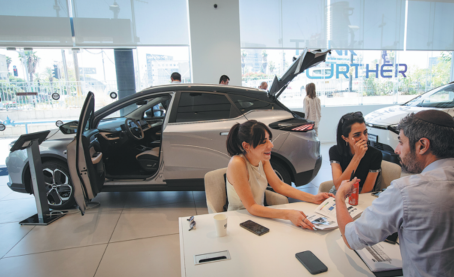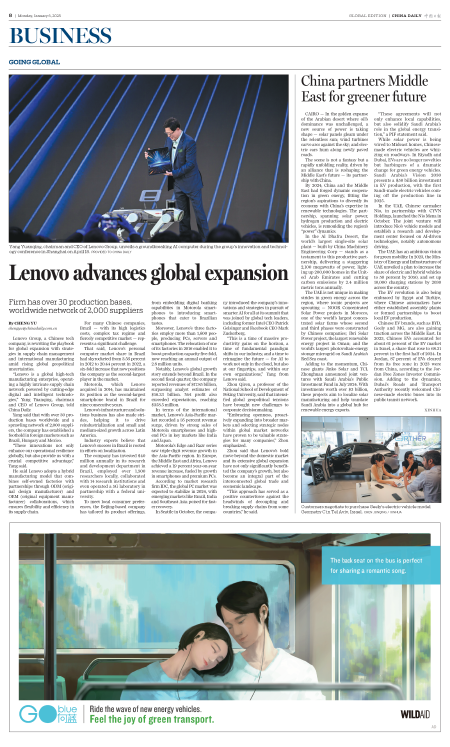CAIRO – In the golden expanse of the Arabian desert, where oil's dominance was unchallenged, a new energy source is taking shape – solar panels glow under the relentless sun; Wind turbines draw arcs in the sky; and electric cars whir along newly paved roads.
The scene is not a fantasy but a rapidly unfolding reality, driven by an alliance that is reshaping the future of the Middle East – its partnership with China.
By 2024, China and the Middle East had forged dynamic green energy cooperation, meeting the region's aspirations to diversify its economy with China's expertise in renewable technologies. The partnership, which includes solar energy, hydrogen production and electric vehicles, is changing the region’s “energy” dynamic.
In the Al Dhafra Desert is the world's largest single-site solar plant – built by China Machinery Engineering Corp. – proof of this productive partnership. It supplies an incredible 2,100 megawatts of electricity, lighting 200,000 households in the United Arab Emirates and saving CO2 emissions by 2.4 million tonnes annually.
The UAE is not alone in making progress in green energy across the region, where iconic projects are being built – NOOR Concentrated Solar Power projects in Morocco, one of the world's largest concentrated solar parks, its second and third phases by Chinese companies were built; Ibri Solar Power Project, the largest renewable energy project in Oman; and the world's largest photovoltaic energy storage microgrid on the Red Sea coast of Saudi Arabia.
Adding to the momentum, Chinese giants Jinko Solar and TCL Zhonghuan announced joint ventures with Saudi Arabia's Public Investment Fund in July 2024. With investments worth over $3 billion, these projects aim to localize solar production and help make Saudi Arabia a global hub for renewable energy exports.
“These agreements will not only improve local capabilities, but also consolidate Saudi Arabia’s role in the global energy transition,” a PIF statement said.
As homes in the Middle East are powered by solar energy, Chinese-made electric vehicles are racing on the roads. In Riyadh and Dubai, electric vehicles are no longer novelties but harbingers of a dramatic shift in green energy vehicles. Saudi Arabia's Vision 2030 calls for a $50 billion investment in electric vehicle production, with the first Saudi-made electric vehicles expected to roll off the assembly line in 2025.
In the United Arab Emirates, Chinese automaker Nio launched the Nio Mena in October in collaboration with CYVN Holdings. The joint venture will introduce Nio's vehicle models and establish a research and development center focused on AI-driven technologies, particularly autonomous driving.
The UAE has an ambitious vision for green mobility. In 2023, the UAE Ministry of Energy and Infrastructure unveiled a plan to increase the share of electric and hybrid vehicles to 50 percent by 2050 and to establish 10,000 charging stations nationwide by 2030.
The electric vehicle revolution is also being welcomed in Egypt and Turkey, where Chinese automakers have either set up assembly plants or formed partnerships to boost local electric production.
Chinese electric vehicle brands such as BYD, Geely and MG are also gaining importance in the Middle East. In 2023, Chinese electric vehicles accounted for about 61 percent of the electric vehicle market in Israel, a share that increased to 68.31 percent in the first half of 2024. In Jordan, 87 percent of the electric vehicles released from the free zone in 2023 came from China to the Jordan Free Zones Investor Commission. Adding to the momentum, Dubai Roads and Transport Authority recently introduced Chinese-made electric buses into its public transport network.
Xinhua

Customers negotiate the purchase of Geely's Geely C electric vehicle model in Tel Aviv, Israel. CHEN JUNQING/XINHUA
